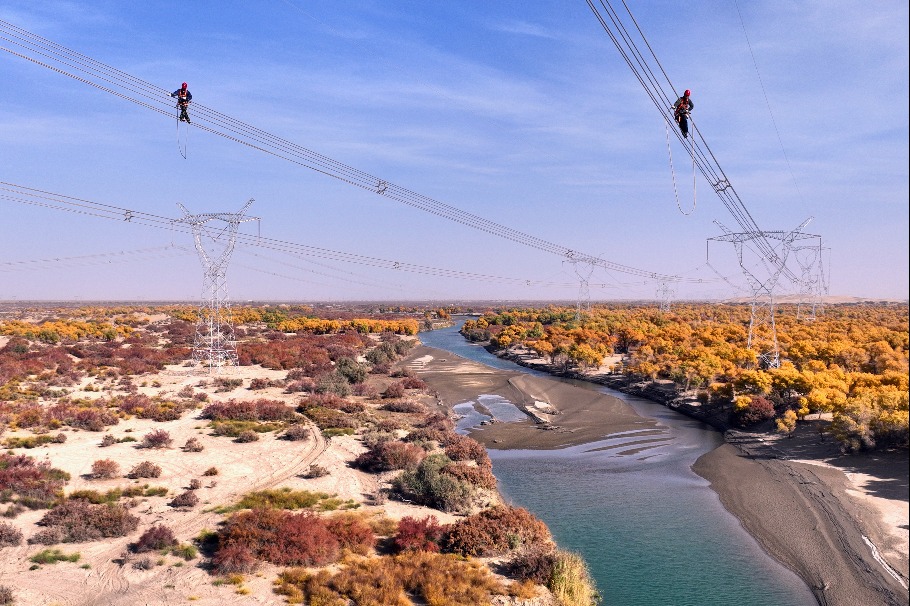Blaming China won't solve America's problems

It appears to them that it is politically incorrect to discuss progress of Chinese response. They may want to talk about how the Republic of Korea, Japan, Singapore responded to the outbreak, without mentioning that China, with a far larger population, might offer equally if not more important references for the US Under such circumstances, reporting and discussing China's effectiveness in mitigating and containing COVID-19 are often viewed as parroting "Chinese propaganda", siding with China, and undercutting Trump's presidential campaign.
For example, on April 10, the White House included in its online "1600 Daily" summary of key news and events a statement entitled "Voice of America Spends Your Money to Speak for Authoritarian Regimes." The statement referred to a Voice of America (VOA) story and two posts that, it asserted, "amplified Beijing's propaganda" about COVID-19. The statement criticized VOA, America's own official propaganda tool and foreign policy instrument, for running an Associated Press article on its website on April 7, which referred to Wuhan's lockdown as a "model" for other countries battling the coronavirus.
CNN and its journalists, often running negative coverage of China, have recently been accused by the pro-Trump camp of "shielding China amid growing suspicion of its handling of the outbreak as well as its data of reported cases and deaths from the virus", because CNN.com ran an article about the People's Liberation Army (PLA) of China, saying that "a Chinese naval flotilla headed into the Pacific over the weekend, evidence that the People's Liberation Army Navy has done a much better job controlling coronavirus than the US Navy, according to a story posted on the PLA's English-language website."
On May 10, in a tweet, Trump accused CBS and "60 minutes" of "doing everything within their power" to "defend China". His tweet came shortly after the network aired a story featuring virologist Peter Daszak, debunking false claims about the Wuhan lab. Peter Daszak told CBS News that "we're a nonprofit research organization that focuses on understanding where the pandemics come from, what's the risk of future pandemics and can we get in between this pandemic and the next one and disrupt it and stop it." However, the funding from the NIH, the US National Institutes of Health, to EchoHealth was recently removed due to the political disinformation campaign targeting the Wuhan lab, according to CBS News.
Such a kind of spinning by the Trump administration, based on their political needs rather than factual evidence, has reinforced China bashing and existing partisan divides in America. The Trump administration and Republican strategists have determined that it would be their best bet to turn virus fight into a political game, about who can stand up to China, instead of who can better deal with such a crisis as the pandemic. The crisis has been exploited for political gains in the presidential campaign. According to Axios, a leading pro-Trump super PAC has been testing a new ad campaign to paint Joe Biden as soft on China and redirect criticism of President Trump's coronavirus response. America First Action would spend $10 million in Michigan, Wisconsin and Pennsylvania to brand the presumptive Democratic nominee as "Beijing Biden".
This kind of political disinformation campaign has further polarized American society. At a time of pandemic crisis around the world, partisan polarization in the US and hardened tensions between China and the US do not bode well for the global fight against coronavirus. So far, the Trump administration has chosen to increase animosity against China and not to play a leading role in forging a global coalition against coronavirus. A case in point, the US was conspicuously absent so far from a virtual world-wide pledging fund, driven by the European Commission, which has raised over $8 billion for the development and "universal deployment" of a COVID-19 vaccine and other medical treatments. The snub followed President Donald Trump's decision in April to halt funding for the WHO.
As Richard Haass, President of Council on Foreign Relations, recently wrote, "It would be a major strategic error to make confronting China the organizing principle of US foreign policy. To do so would be to misread a world in which the most significant threats come from global problems such as disease, climate change, & terrorism."


































